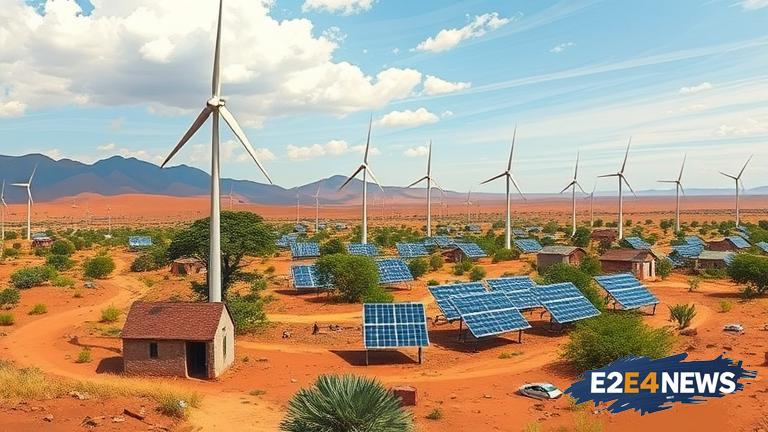The African continent is witnessing a significant shift towards renewable energy, driven by the need to address the pressing issues of energy access, energy security, and climate change. With many countries still struggling to provide reliable and affordable electricity to their citizens, renewable energy has emerged as a viable solution. Solar and wind power are becoming increasingly popular, with countries like South Africa, Egypt, and Morocco leading the charge. The cost of renewable energy technologies has decreased dramatically over the years, making them more competitive with fossil fuels. This has led to a surge in investment in the sector, with many international companies and organizations committing to support Africa’s renewable energy ambitions. The African Union’s Agenda 2063 has set a target of ensuring that at least 50% of the continent’s energy mix comes from renewable sources by 2030. To achieve this goal, countries are implementing policies and regulations to support the development of renewable energy projects. For example, South Africa has introduced a renewable energy independent power producer procurement program, which has attracted significant investment and led to the development of several large-scale solar and wind farms. Egypt has also launched a number of initiatives to promote the use of renewable energy, including a feed-in tariff program and a plan to generate 20% of its electricity from renewable sources by 2022. Morocco has set a target of generating 52% of its electricity from renewable sources by 2030 and has launched a number of projects to achieve this goal, including the development of a large-scale solar power plant in the Sahara Desert. The use of renewable energy is not only helping to reduce Africa’s dependence on fossil fuels but also creating jobs and stimulating local economies. In fact, a report by the International Renewable Energy Agency (IRENA) estimates that the renewable energy sector could support up to 24 million jobs globally by 2030, with a significant proportion of these jobs being created in Africa. Furthermore, renewable energy can help to reduce greenhouse gas emissions and mitigate the impacts of climate change, which are having a devastating impact on many African countries. Climate change is leading to more frequent and severe droughts, floods, and heatwaves, which are affecting agricultural productivity, food security, and human health. By transitioning to renewable energy, African countries can reduce their carbon footprint and contribute to global efforts to address climate change. In addition to the environmental benefits, renewable energy can also help to improve energy access and reduce energy poverty. Many African countries have significant populations that lack access to modern energy services, which can hinder economic development and social progress. Renewable energy can help to address this issue by providing energy access to off-grid communities and supporting the development of mini-grids and other decentralized energy systems. The development of renewable energy in Africa is also being driven by technological innovations, such as the use of blockchain and artificial intelligence to manage energy distribution and consumption. These technologies can help to improve the efficiency and reliability of renewable energy systems, making them more attractive to investors and consumers. Overall, the future of renewable energy in Africa looks bright, with many countries committed to supporting the development of this sector. As the continent continues to grow and develop, it is likely that renewable energy will play an increasingly important role in meeting its energy needs and reducing its dependence on fossil fuels. With the right policies and investments in place, Africa can unlock the full potential of renewable energy and create a more sustainable and prosperous future for its citizens. The growth of renewable energy in Africa is also expected to have a positive impact on the environment, as it will reduce the continent’s reliance on fossil fuels and decrease greenhouse gas emissions. This, in turn, will help to mitigate the impacts of climate change and support global efforts to address this pressing issue. In conclusion, the renewable energy revolution in Africa is gaining momentum, driven by the need to address energy access, energy security, and climate change. With the right policies and investments in place, the continent can unlock the full potential of renewable energy and create a more sustainable and prosperous future for its citizens.
